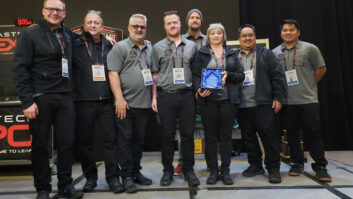WASHINGTON — Joe Clayton, president/CEO of Dish, grabbed the spotlight at the Consumer Electronics Association’s (CEA) annual Digital Patriots dinner, held here last Wednesday, discussing the proposed merger of Dish and Sprint, a combination of more than 200MHz of wireless spectrum, and the ongoing battle with broadcasters about the Hopper.
Clayton, a former CEA chairman and CEA Hall of Famer, who was presented with CEA’s Digital Patriots award along with a U.S. Senator and two members of the House of Representatives, was regaling the audience of stories of how to serve customers while innovating.
In reflecting on his 40-year career, Clayton outlined his “radical business philosophy,” which is: “Let’s give the consumer what he or she wants! That’s a winning formula for success that implies embracing change, embracing technology and, most importantly, the consumer.”
Regarding the possible Dish/Sprint combination, he said the advantages of combining the two are “one national service that can offer in- and out-ofhome wireless voice, video and data at one attractive retail price on one bill. We would have the ability to reach consumers wherever they go with services that are easy to understand, affordable and available anywhere — from the biggest cities to the far reaches of rural America, where Dish was born.”
Before the dinner Clayton told TWICE that he could see regional electronics/appliance retailers selling these packages and “selling handsets” in the future.
Clayton noted that the “American corporate graveyard” is littered with “dead companies” that failed to give the consumer what it wants, recalling how the VCR was opposed “by programmers, broadcasters and studios,” only later to become “a cash cow” for them as consumers began to embrace home video.
In the case of HDTV it was “debated and delayed by broadcasters and the computer industry for over a decade” only to become “a huge benefit and attraction for viewers and advertisers.” Satellite TV was fought by broadcasters and cable companies “while today it delivers content to more than 30 million subscribers.”
He asked why these other industries would “oppose rather than embrace innovation,” surmising, “Innovation upsets the status quo and is very difficult. There is a tremendous amount of innovation, risk and worry that comes from actually having to deliver better products. It’s really hard work! It’s much easier to call the other guy’s stuff ‘illegal,’ then knock off early.”
In discussing the current dispute of Dish’s commercial- evading device, the Hopper, Clayton said, “Broadcasters would have you believe that it’s illegal to skip TV commercials. But that’s something we’ve done since the introduction of remote control. If it’s illegal, then we’re just a nation of outlaws.”
He added, “Seriously, we think advertising can be better targeted to the viewer. So Dish isn’t just about giving people what the ability to hop over commercials. We’re designing different ways to reach viewers with messages they just might actually care about.”
CEA’s other Digital Patriot Award winners were: Sen. Jerry Moran (R-Kan.), who led the opposition to defeat the Protect IP Act (PIPA) last year; Rep. Jared Polis (D-Colo.), who launched Bluemountain.com and Proflowers.com and has worked in Congress to improve education and pushed for immigration reform; and Rep. Greg Walden (R-Ore.), who won the Innovation Policy Ninja Award, “which recognizes a policy maker who is forward thinking and advances public policies that will spur innovations for decades to come,” CEA said.












